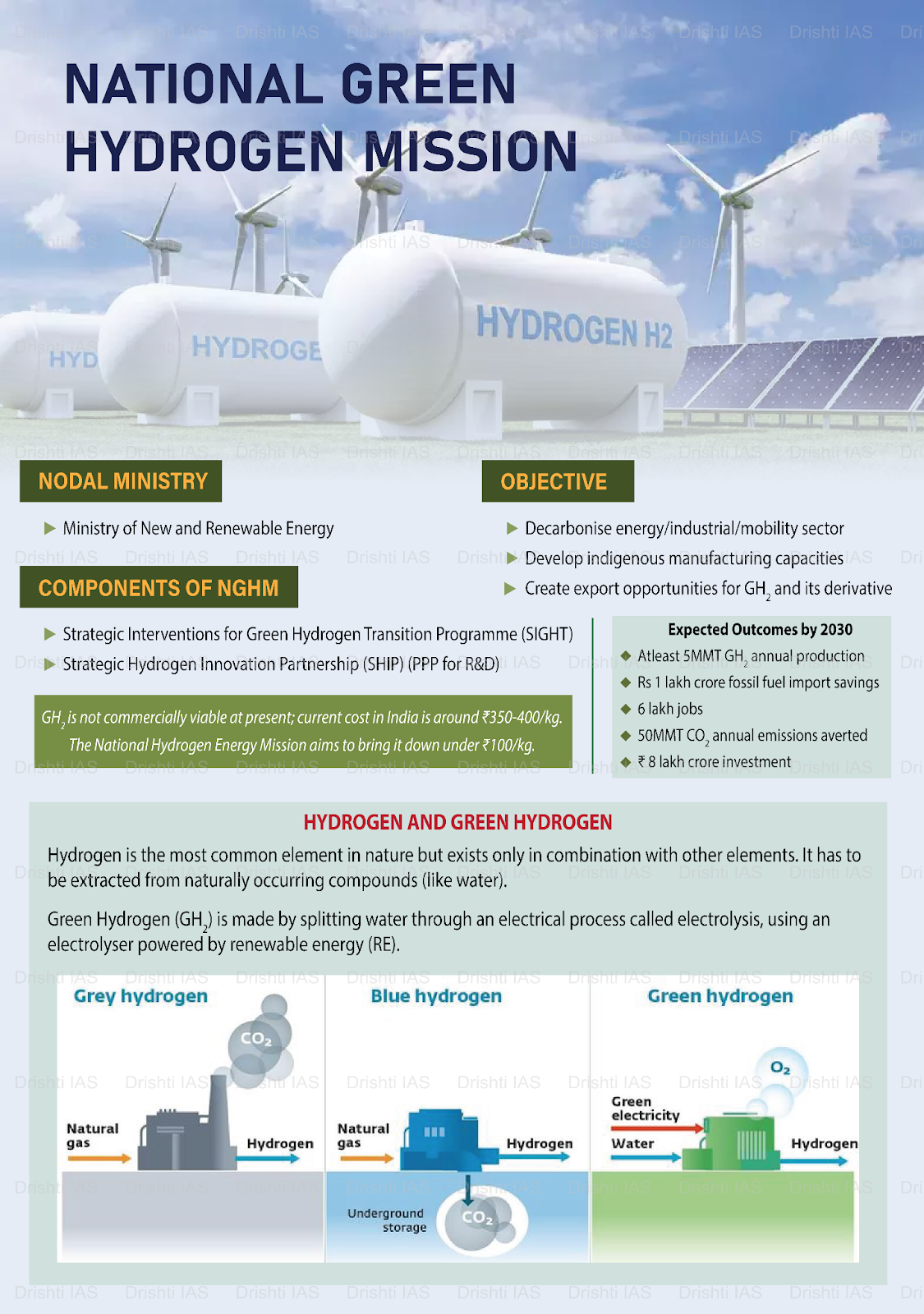Green Hydrogen Projects and SEZs | 16 Dec 2023
Why in News?
The Indian government is considering amendments to current regulations that could pave the way for significant fiscal benefits for renewable energy projects focused on producing green hydrogen within Special Economic Zones (SEZs).
What are the Key Proposed Amendments?
- Expanding SEZs for Green Hydrogen Projects: The Ministry of Commerce is contemplating permitting SEZs to span multiple non-contiguous areas, specifically catering to green hydrogen initiatives.
- Presently, SEZs require a contiguous land area of 50 hectares or more. The commerce ministry is open to relaxing this criterion for green hydrogen projects.
- Allowing multi-locational SEZs will enable developers to use wind energy for which turbines are placed at a considerable distance (250 to 400 metres) from each other.
- Eligibility for Fiscal Benefits: The proposed amendment aims to grant fiscal benefits to renewable energy plants used for captive consumption within SEZs.
- Currently, SEZ rules do allow fiscal benefits only for renewable energy plants set up as SEZ units and meant for selling power outside of SEZs.
- However, renewable energy plants become ineligible for benefits when used for captive consumption.
- Currently, SEZ rules do allow fiscal benefits only for renewable energy plants set up as SEZ units and meant for selling power outside of SEZs.
- These changes, if approved, will enable export-oriented green hydrogen ventures to access tax breaks for establishing and operating renewable energy facilities dedicated to green hydrogen production.
Note
Captive consumption refers to the utilization of goods or services within the premises of the producing entity or within a designated area, without their transfer or sale to external markets.
What is a Special Economic Zone?
- About: A Special Economic Zone (SEZ) is a geographical region that has economic laws that are more liberal than a country's domestic economic laws.
- The category 'SEZ' covers a broad range of more specific zone types, including, but not limited to:
- Free Trade Zones (FTZs)
- Export Processing Zones (EPZs)
- Free Zones (FZs)
- Industrial Estates (IEs)
- India was one of the first in Asia to recognize the effectiveness of the Export Processing Zone model in promoting exports, with Asia's first EPZ set up in Kandla, Gujarat in 1965.
- The category 'SEZ' covers a broad range of more specific zone types, including, but not limited to:
- SEZs in India: Special Economic Zones Policy in India was announced in April 2000 to enhance foreign investment, creation of employment opportunities and provide an internationally competitive and hassle-free environment for exports along with the development of infrastructure facilities.
- All laws of India are applicable in SEZs unless specifically exempted as per the SEZ Act/ Rules.
- Each Zone is headed by a Development Commissioner and is administered as per the SEZ Act, 2005 and SEZ Rules, 2006.
- Units may be set up in the SEZ for manufacturing, trading or for service activity.
- All laws of India are applicable in SEZs unless specifically exempted as per the SEZ Act/ Rules.
UPSC Civil Services Examination Previous Year Question (PYQ)
Q. With reference to green hydrogen, consider the following statements : (2023)
- It can be used directly as a fuel for internal combustion.
- It can be blended with natural gas and used as fuel for heat or power generation.
- It can be used in the hydrogen fuel cell to run vehicles.
How many of the above statements are correct?
(a) Only one
(b) Only two
(c) All three
(d) None
Ans: (c)

